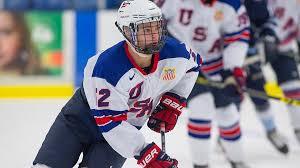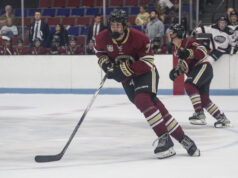By Mike G. Morreale @mikemorrealeNHL / NHL.com Staff Writer —
United States National Junior Team coach Bob Motzko is prepared to give his players what he called structural freedom to do what they do best at the 2017 IIHF World Junior Championship, according to longtime NCAA hockey analyst Dave Starman.
Starman recently discussed with NHL.com the chances of the United States winning a medal for a second straight tournament at the 2017 WJC, will provide commentary on NHL Network alongside play-by-play partner Steve Mears for every U.S. game at Air Canada Centre in Toronto and Bell Centre in Montreal beginning Monday through Jan. 5, 2017.
Starman, who has covered the tournament for various media outlets during the past nine seasons, believes the United States will need to establish an ability to score early and often.
“They need to control the pace of games,” Starman said. “The U.S. has gotten into trouble when they fail to do this because all of a sudden they get fragile, thinking that they’re not going to score. To me this tournament is about chemistry, confidence and controlling the pace; if you don’t have that going for you, you’re chasing games. And the last thing you want to be doing is chasing games in this tournament.”
Starman said he sees a lot of similarity with how Motzko runs his practices at St. Cloud State University and how Jerry York, the all-time NCAA leader in victories, runs his at Boston College.
“If you look at the skilled programs in college hockey, or those programs that bring in a lot of skilled players, Motzko and York are all about high compete, flow and skill,” Starman said. “You see the similarities in terms of how they want structure, but they don’t want to take away from the skill that they’ve recruited either. That’s the beauty of Boston College and St. Cloud State.”
One of the challenges for Motzko will be moving from an Olympic-sized rink at St. Cloud State to an NHL-sized rink at Air Canada Centre, where the U.S. will play all its preliminary-round games. Starman said he doesn’t believe it will be that big an adjustment.
“Bob’s teams use that Herb Brooks National Hockey Center rink [in St. Cloud, Minnesota] so well, but when they go on the road their game translates,” Starman said. “So the adjustments he’s making is that he wants to take his philosophy of the big-ice game and condense it a little bit to play at the pace of, say, the NHL style. I don’t expect much of an east/west game; he’s going to want to go more north/south.
“Bob loves to use the term ‘ground game,’ and he never has a problem creating a system with his players where you chip pucks off walls and create footraces in order to let the puck do the hard work while letting the skating skill take over a game.”
In 2015-16, St. Cloud State scored 175 goals in 41 games (4.27 per game), and the power play scored on 41 of 139 opportunities (29.5 percent). Motzko had this season’s team averaging 3.38 goals per game and the power play scoring on 20.6 percent of its chances in 16 games before he left to concentrate on coaching the U.S. WJC team.
“Motzko’s been really good at establishing pace and tempo by cycling, grinding, working pucks down low, and going low-to-high, so he can take the NHL game with this team and still maintain the integrity of big-ice game with the skill he’ll have on the United States,” Starman said.
“This U.S. team is a Bob team because it has a ton of skill, guys who can skate, guys who can score, and Bob will go in there and win every game 7-6 and be very happy. He’s not looking for a masterpiece but looking for wins, and I think this team reflects the way he wants to play.”
(Reprinted with permission of NHL.com)







